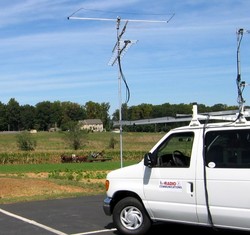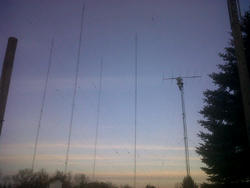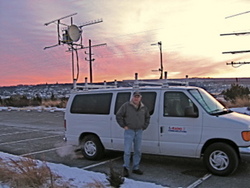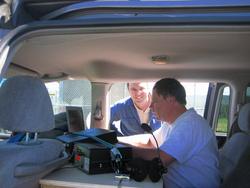 February 16, 2011 Editor: Ward Silver, NØAX | ||||||
IN THIS ISSUE
NEW HF OPERATORS - THINGS TO DO The ARRL DX Contest - in which all the DX stations vie for contacts with US and Canadian stations - is a great opportunity for Little Pistol stations to fill their logbooks (as well as their QSL bureau envelopes and LOTW accounts) with DX QSOs from around the world. The contest has new categories for Low Power operation, too. This weekend features CW followed by Phone two weeks later! BULLETINS Sunspot 1158 is firing off all sorts of flares - the strongest in four years - and causing disruptions to the geomagnetic field as this issue is being readied for distribution (Tuesday morning). Depending on how active it remains over the next couple of days there may be significant impact to HF propagation for the ARRL DX CW Contest this weekend. Watch Spaceweather.com for the latest solar news! BUSTED QSOS None reported from last week's issue! CONTEST SUMMARY Complete information for all contests follows the Conversation section Feb 19-20
Feb 26-27
CQ WPX Director, Randy K5ZD, continues innovating like that giant sunspot firing off solar flares. "I am pleased to announce a new tool to help everyone format their logs correctly for the WPX Contest. The Cabrillo Log Check page will check the format of your Cabrillo log file for any mode of the CQ WPX Contest. Use this to check your log before submitting it to the robot." The new page by Tzetzo LZ2FQ supports CQ WPX RTTY, SSB, and CW in Cabrillo 2 or 3 formats.
More innovation in contest administration comes from the Russian DX Contest Committee as they tighten up the requirements for winning logs with new rules. Competitive logs will now be required to specify frequencies with a 1-kHz resolution and to be submitted within 36 hours. The intent is to crack down on post-contest log editing and during-the-contest spotting information poaching. (Thanks, Harry RA3AUU) Ham radio was a key element of the February 2011 Scientific American article, "Citizen Satellites on CubeSats". The story covers satellite standardization of design and internal structure and how it has enabled a CubeSat "community", likened to a cottage industry of universities and organizations that can now launch their own satellite for less than $100,000. So why does ham radio still have such a devoted following in the face of modern telecommunication wizardry? This article on the Wired web site by David Rowan offers some opinions. As the author says, "You can tweet all you like, but this is the way to communicate." (Thanks, Jim W4JTP and Brad W1NT) An article reviewing CQ WW 160 Meter CW by the YE1C team may be of interest to those who want to know how the noise and static crashes affect Top Band operation in Indonesia. "For the first time ever in Indonesia, we installed nine RX antennas but due to poor propagation on 160 meters, the QSO totals are lower than in 2010." (Thanks, Jo YCØLOW) Speaking of Top Band, reservations and tickets are now available for the 22nd Annual Dayton Top Band Dinner to be held on Friday, May 20 at the Crowne Plaza in downtown Dayton, Ohio. (Thanks, Tim K3LR) Since the Universe now seems to be more than 250 times bigger than observable, hams everywhere know the answer - we need bigger antennas! Bob N6TV made a good suggestion - the simplicity of Morse code might be a way to communicate with someone who is incapable of speaking due to a stroke or other injury. Does your family know about code readers and other means of engaging via CW? If you can wiggle your fingers, the message might be able to get through! How much does it cost to mail something? You can find out by using the online USPS postage calculator. It might take a while to lick enough stamps to mail that Collins 75A4 receiver, though.
We have a celebration coming up - Leo Meyerson, WØGFQ, turns 100 years old on February 24th. Leo was the founder of World Radio Labs in Council Bluff, Iowa, and his WRL Globe and Galaxy lines of radios put a lot of hams on the air from the 1950's through the 1970's. (Thanks, Phil K3UA) Web Site of the Week - In the latest IARU e-letter, ARRL ex-president Rod W6ROD presents an in-depth look at the International Telecommunications Union (ITU), the international regulatory body that oversees the radio spectrum. It makes for informative reading and W6ROD promises more articles about international licensing and allocations in future issues. WORD TO THE WISE "Temporary" adj. - used by a ham radio operator in obtaining permission to erect antennas and meaning "until I die". It was a little crowded in the UK early on Sunday morning during the CQ WW 160 Meter contest as this visual display from Ian G3NRW's SDR attests. The Minnesota QSO Party proved to be a great training ground for Sarah WØMSW using her school's club call sign under the watchful video camera of her dad, Scott KØMD. Sarah's two sisters are also licensed and the younger brother getting into the act in the background will soon be clamoring for rig time, as well. State QSO parties are great introductions to radiosport! Dan K1TO recalls climbing a 600-foot tower in Vienna, Austria during his European trip to WRTC-2000 from which he could see HA, OE, OK, OM, and 4U1VIC. Where else could you see a similar sight? The Wikipedia pages on country borders give some clues. Surprisingly, there are no "Four Corners" in the world of international borders. Not exactly radio, but definitely one of the better homebuilt accomplishments you will ever see. (Thanks, Kirk K4RO) Don't forget the new categories in the ARRL DX Contest - Multioperator, Single Transmitter and Single-Operator, Assisted now have High and Low Power divisions. Delivered by contest writeup author Bruce W9FZ, results for the 2010 ARRL 10 GHz and Up Cumulative contest are now online. Watch for K9LA's writeup for the 2010 IARU HF Championship contest before long. (Thanks, ARRL Contest Branch Manager, Sean KX9X)
AA5B and KK6MC are sponsoring a major award for the top multioperator entry in the Spring QRP-ARCI QSO Party. "The multioperator category is a great one in many ways and it is a shame that many QRP contests do not offer this option and that more QRP operators do not pursue this category when available in a contest. By offering a major award to the winners of the multioperator category, we are hoping to encourage more participation in the multioperator category, and perhaps to encourage more contest organizers to include a multioperator category." (Thanks, James KK6MC) OPERATING TIP Pre-de-caffeinate yourself during the week before a major contest so that when you really need that coffee kick late in the game you aren't fighting your normal tolerance. Soak up the sleep now and save the stimulation for after you've exhausted your regular resources. The term "G5RV antenna" is applied to lots of antennas that would be hard for G5RV to recognize as his creation. If you want "the original Greek", G5RV's original article from 1958 is available online. (Thanks, Bill K4CIA)
Glenn KDØQ is a big fan of the Safety LifeLine for climbing his AN Wireless free-standing tower. "The sleeve that attaches to the cable also attaches directly to the front of my harness - I use no lanyard. The sleeve slides right along the cable with me as I climb. It really reduces the time it takes to climb the tower compared to hooking and unhooking two lanyards. I feel much safer as the hooking and unhooking is eliminated and there is little slack to take up if something happens." If you want a reliable, rugged footswitch, follow the lead of the tattoo artist whose customers would not care at all for incomplete body art. Ron WW8RR - who is not a tattoo artist - recommends the Linemaster Gem switches. "These are round, heavy duty, weighted, non-skid, virtually indestructible foot switches. Since they are round it doesn't matter which angle your foot hits the switch, it activates. The internal design does not use any micro switch, but instead has three compression springs, heavy brass rings, and steel plate. It is as robust as it gets. There is really nothing in the design to wear out or fatigue." Homebuilders and repair techs are finding that PCB-mounted pots and controls are more likely to have 6-mm diameter shafts that won't securely hold a knob designed for a 0.25-inch shaft. Ken WA4MNT shows how to add a plastic sleeve over the shaft to solve the problem. Use the next smaller size from 3/16" and slit it to fit - don't heat it up. Graham VE3GTC notes that some brass shim of 0.005-006" thickness will also do the job. The CalculatorEdge is another great web page with tons of engineering calculators for just about any kind of technical problem. (Thanks, Russ KDØEIA) KL7RA asked if the Data Shark coax trimming tool mentioned in the previous issue might nick the inner conductor of RG-213, so I asked N4ZR about it. "I made the original statement based on the diameters of the outer jackets, but wondered about the inner conductor myself, so I tried it. To my pleased surprise, even with no skill involved, it did not touch the inner conductor. In the event of slight variations in RG-213, perhaps a caution would be in order - you'll hear the blade cut the braid, then silence while it goes through the dielectric. If you don't hear it at the end, then it hasn't hit the inner conductor. If it has, back out, try again, and stop a little short of the point where it starts to sound off. Not much skill required." When using steel conduit for running coax cables, Roger K8RI points out, "Carefully de-burr the ends of the conduit as a tiny burr can peel the jacket right off a piece of coax. Leave no rough edges that can contact the coax." Ends of conduit need to be fully seated into couplers and fittings, too. "If not fully seated [the edge] will form a squared-off edge of 1/4 to nearly 3/8"" on which cables can catch. If need be, bevel the inside of the male end to a 60-degree angle so there is no lip." Roger also recommends the use of two 45-degree "sweeps" to make a 90-degree turn as they put a lot less stress on the cable when pulling it through. And use lots of inexpensive wire soap, too!
For someone with a few years of antenna work ahead of them and an interest in welding, check out your local school system's nighttime adult education classes. (Thanks, Gene W2LU) Pat KCØZIW recommends an outstanding tool for finding the correct beam heading and distance for DX countries that's also a good prefix reference. Just follow the instructions on the web page. Technical Web Site of the Week - For information on how to use HFTA by Dean N6BV and what it can do for your station take a look at the Yankee Clipper Contest Club's website for presentations by Dean. You can also find webinars on HFTA and other resources on the Potomac Valley Radio Club and Northern California Contest Club websites as well. (Thanks, Jim K7WA) Sailin' Cross the Sea Lanes The VP8ORK team has returned to continental land, having successfully crossed the rough seas of the Drake Passage after 60,000+ QSOs from the South Orkneys. With the team including many call signs very familiar in the world of radiosport, I thought a song might be appropriate with a nod to Rich KL7RA for providing the initial seed of inspiration. Thanks for the strong work, fellows! 73, Ward NØAX Sailin' Cross the Sea Lanes My Pelican's packed, I'm ready to go But the dawn is breakin', it's early morn So work me and spot for me There's so many times I've worn you down Every place I go, I listen for you So work me and spot for me Now the time has come to leave, to Dream of dinner talks to come So work me and spot for me 16 February through 1 March An expanded, downloadable version of QST's Contest Corral in PDF format is available. Check the sponsor's Web site for information on operating time restrictions and other instructions. HF CONTESTS Semi-Automatic Key Evening--CW, from Feb 16, 1900Z to Feb 16, 2030Z. Bands (MHz): 3.5. Exchange: RST, serial, first year of bug use. Logs due: Mar 15. Rules Russian WW PSK Contest--Digital, from Feb 18, 2100Z to Feb 19, 2100Z. Bands (MHz): 1.8-28. Exchange: RST and oblast code or serial. Logs due: 15 days. Rules ARRL Int'l CW DX Contest--CW, from Feb 19, 0000Z to Feb 20, 2400Z. Bands (MHz): 1.8-28. Exchange: RST, state/province or power. Logs due: Mar 21. Rules Feld-Hell Annual WAS Sprint--Digital, from Feb 19, 2000Z to Feb 19, 2200Z. Bands (MHz): 1.8-28. Frequencies: Monthly on 3rd Saturday. Exchange: RST, QTH, Feld-Hell number. Rules AM QSO Party--Phone, from Feb 19, 2300Z to Feb 20, 2300Z. Bands (MHz): 3.5-14. Exchange: RS, name, and S/P/C. Logs due: 4 weeks. Rules CQ WW 160 Meter SSB--Phone, from Feb 25, 2200Z to Feb 27, 2200Z. Bands (MHz): 1.8. Exchange: RST and state/province or CQ zone. Logs due: Mar 31. Rules REF Contest--Phone,CW, from Feb 26, 0600Z to Feb 27, 1800Z. Bands (MHz): 3.5-28. Exchange: RS and French dept or serial. Logs due: 30 days. Rules UBA Contest--CW, from Feb 26, 1300Z to Feb 27, 1300Z. Bands (MHz): 3.5-28. Exchange: RS, serial, and ON province. Logs due: 2 weeks. Rules Mississippi QSO Party--Phone,CW, from Feb 26, 1500Z to Feb 27, 0300Z. Bands (MHz): 3.5-28, 50-432, Frequencies: CW 3.545,7.045,14.045,21.045, 28.045;Phone 3.857-862-867,7.238,14.275,21.375,28.375;VHF 50.13,144.22,146.55,446. Exchange: RS(T) and MS county or S/P/C. Logs due: Mar 31. Rules North American QSO Party--Digital, from Feb 26, 1800Z to Feb 27, 0600Z. Bands (MHz): 3.5-28. Exchange: Name and S/P/C. Logs due: 14 days. Rules North Carolina QSO Party--Phone,CW, from Feb 27, 1700Z to Feb 28, 0300Z. Bands (MHz): 3.5-28. Frequencies: CW 3.54,3.74,7.04,7.14,14.04,21.04,21.14,28.04,28.14, Phone 3.86,7.26,14.26,21.36,28.36. Exchange: RS(T) and NC county or S/P/C. Logs due: Apr 1. Rules CQC Winter QSO Party--Phone,CW, from Feb 28, 0100Z to Feb 28, 0259Z. Bands (MHz): 3.5-14. Frequencies: 3.560, 7.040, 14.060. Exchange: RS(T), S/P/C, name, CQC nr or power. Logs due: 30 days. Rules YL CW Party--CW, from Mar 1, 1900Z to Mar 1, 2100Z. Bands (MHz): 3.5. Exchange: RST, serial, if YL "YL," name. Logs due: Mar 31. Rules VHF+ CONTESTS Pennsylvania FM Sprint--Phone, from Feb 26, 7 PM to Feb 26, 11 PM. Bands (MHz): 50-440. Exchange: Call sign, serial, and 5-digit Zip code. Logs due: Mar 18. Rules Mississippi QSO Party--Phone,CW, from Feb 26, 1500Z to Feb 27, 0300Z. Bands (MHz): 3.5-28, 50-432, Frequencies: CW 3.545,7.045,14.045,21.045, 28.045;Phone 3.857-862-867,7.238,14.275,21.375,28.375;VHF 50.13,144.22,146.55,446. Exchange: RS(T) and MS county or S/P/C. Logs due: Mar 31. Rules LOG DUE DATES 16 February through 1 March February 18 - SKCC Weekend Sprint February 19 - Asia-Pacific Spring Sprint, CW February 19 - WAB 1.8 MHz Phone February 19 - North American Sprint, SSB February 20 - SARL Field Day Contest February 21 - 10-10 Int. Winter Contest, SSB February 23 - ARRL January VHF Sweepstakes February 28 - CQ 160-Meter Contest, CW February 28 - SPAR Winter Field Day February 28 - Hunting Lions in the Air Contest February 28 - AGCW Straight Key Party February 28 - RSGB 1st 1.8 MHz Contest March 1 - BARTG RTTY Sprint March 1 - AWA Linc Cundall Memorial CW Contest March 1 - REF Contest, CW March 1 - CQ WW RTTY WPX Contest ARRL Information Click here to advertise in this newsletter. Your One-Stop Resource for Amateur Radio News and Information ARRL membership includes QST, Amateur Radio's most popular and informative journal, delivered to your mailbox each month. Subscribe to NCJ - the National Contest Journal. Published bimonthly, features articles by top contesters, letters, hints, statistics, scores, NA Sprint and QSO Parties. Subscribe to QEX - A Forum for Communications Experimenters. Published bimonthly, features technical articles, construction projects, columns and other items of interest to radio amateurs and communications professionals. Free of charge to ARRL members: Subscribe to The ARRL Letter (weekly digest of news and information), the ARES E-Letter (monthly public service and emergency communications news), Division and Section news -- and much more! ARRL offers a wide array of products to enhance your enjoyment of Amateur Radio. Visit the site often for new publications, specials and sales. Donate to the fund of your choice -- support programs not funded by member dues! ACKNOWLEDGEMENTS ARRL Contest Update wishes to acknowledge information from WA7BNM's Contest Calendar and SM3CER's Contest Calendar. | ||||||











